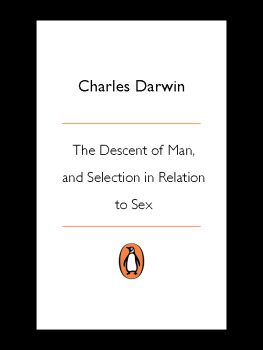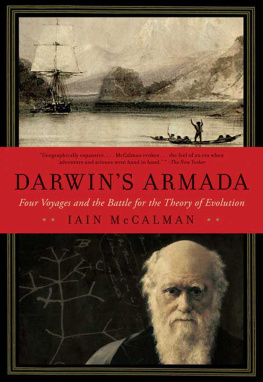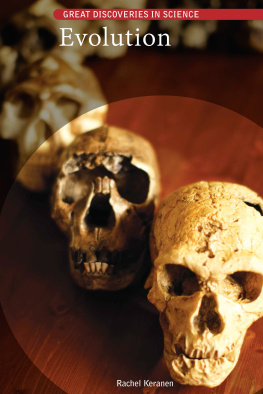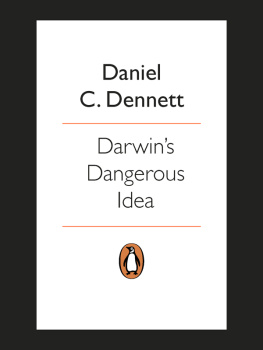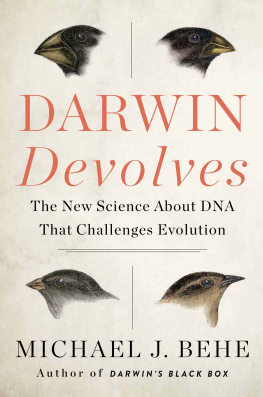Adrian Desmond - Darwins Sacred Cause: How a Hatred of Slavery Shaped Darwins Views on Human Evolution
Here you can read online Adrian Desmond - Darwins Sacred Cause: How a Hatred of Slavery Shaped Darwins Views on Human Evolution full text of the book (entire story) in english for free. Download pdf and epub, get meaning, cover and reviews about this ebook. year: 2009, publisher: Allen Lane, genre: Detective and thriller. Description of the work, (preface) as well as reviews are available. Best literature library LitArk.com created for fans of good reading and offers a wide selection of genres:
Romance novel
Science fiction
Adventure
Detective
Science
History
Home and family
Prose
Art
Politics
Computer
Non-fiction
Religion
Business
Children
Humor
Choose a favorite category and find really read worthwhile books. Enjoy immersion in the world of imagination, feel the emotions of the characters or learn something new for yourself, make an fascinating discovery.

- Book:Darwins Sacred Cause: How a Hatred of Slavery Shaped Darwins Views on Human Evolution
- Author:
- Publisher:Allen Lane
- Genre:
- Year:2009
- Rating:5 / 5
- Favourites:Add to favourites
- Your mark:
- 100
- 1
- 2
- 3
- 4
- 5
Darwins Sacred Cause: How a Hatred of Slavery Shaped Darwins Views on Human Evolution: summary, description and annotation
We offer to read an annotation, description, summary or preface (depends on what the author of the book "Darwins Sacred Cause: How a Hatred of Slavery Shaped Darwins Views on Human Evolution" wrote himself). If you haven't found the necessary information about the book — write in the comments, we will try to find it.
Darwins Sacred Cause: How a Hatred of Slavery Shaped Darwins Views on Human Evolution — read online for free the complete book (whole text) full work
Below is the text of the book, divided by pages. System saving the place of the last page read, allows you to conveniently read the book "Darwins Sacred Cause: How a Hatred of Slavery Shaped Darwins Views on Human Evolution" online for free, without having to search again every time where you left off. Put a bookmark, and you can go to the page where you finished reading at any time.
Font size:
Interval:
Bookmark:
ADRIAN DESMOND and
JAMES MOORE
Race, Slavery and the Quest for
Human Origins
ALLEN LANE
an imprint of
PENGUIN BOOKS
ALLEN LANE
Published by the Penguin Group
Penguin Books Ltd, 80 Strand, London WC2R 0RL , England
Penguin Group (USA) Inc., 375 Hudson Street, New York, New York 10014, USA
Penguin Group (Canada), 90 Eglinton Avenue East, Suite 700, Toronto, Ontario, Canada M4P 2Y3 (a division of Pearson Penguin Canada Inc.)
Penguin Ireland, 25 St Stephen's Green, Dublin 2, Ireland (a division of Penguin Books Ltd)
Penguin Group (Australia), 250 Camberwell Road, Camberwell, Victoria 3124, Australia (a division of Pearson Australia Group Pty Ltd)
Penguin Books India Pvt Ltd, 11 Community Centre, Panchsheel Park, New Delhi 110 017, India
Penguin Group (NZ), 67 Apollo Drive, Rosedale, North Shore 0632, New Zealand (a division of Pearson New Zealand Ltd)
Penguin Books (South Africa) (Pty) Ltd, 24 Sturdee Avenue, Rosebank, Johannesburg 2196, South Africa
Penguin Books Ltd, Registered Offices: 80 Strand, London WC2R 0RL , England
www.penguin.com
Copyright Adrian Desmond and James Moore, 2009
The moral right of the authors has been asserted
All rights reserved.
Without limiting the rights under copyright reserved above, no part of this publication may be reproduced, stored in or introduced into a retrieval system, or transmitted, in any form or by any means (electronic, mechanical, photocopying, recording or otherwise) without the prior written permission of both the copyright owner and the above publisher of this book
ISBN: 978-0-14-190838-0
I was quite delighted to hear of all your varied accomplishments and knowledge, and of your higher attributes in the sacred cause of humanity.
Darwin, writing in 1859 to the naturalist/anti-slavery activist Richard Hill, the first gentleman of colour in the Jamaican magistracy, assigned to adjudicate between former slave-holders and slaves
Endpapers: Britannia under a scriptural banner declaring all the races of one blood and protecting Africans from slavery. This propaganda label from the Wedgwood family papers was used during the 1850s to rally opposition to the continuing illegal slave trade. (By courtesy of the Wedgwood Museum Trust, Barlaston, Staffordshire)
PLATES
Trekking in the hinterlands of Darwin's world, we have amassed a large number of debts. Many individuals, each with their own expertise in wide-ranging fields, have shared all manner of esoteric knowledge with us the sort that can often be gained nowhere else.
For answering specific queries, sometimes at short notice, we thank colleagues at universities, research libraries, historical societies, museums, professional bodies, heritage sites and scholarly projects around the world: Stephen Alter, Patrick Armstrong, Rich Bellon, Robert Bernasconi, Daniel Brass, Nick Cooke, Martin Crawford, David Daby-deen, John W. de Gruchy, Jeremy Dibbell, Mario di Gregorio, Richard Drayton, Martin Fitzpatrick, Sheila Hannon, Keith Hart, Uwe Hossfeld, Karl Jacoby, Peter McGrath, Chris Mills, Richard Milner, Duncan Porter, Greg Radick, Tori Reeve, Peter Rhodes, Nigel Rigby, Kiri Ross-Jones, Nicolaas Rupke, Matthew Scarborough, Lester Stephens, Keith Thomson, David Turley, Gene Waddell, Sarah Walpole, James Walvin, R. K. Webb and Leonard Wilson.
Without the help of dedicated library and archival staff we would still be searching for vital documents. In particular, for making materials available to us, we are grateful to the libraries of the American Philosophical Society (Valerie-Anne Lutz van Ammers), Christ's College (Candace Guite) and Corpus Christi College (Gill Cannell), Cambridge; Dartmouth College Library (Sarah Hartwell, Rauner Special Collections); Edinburgh University Library; John Murray Archives; John Rylands University Library, Manchester (Les Gray); Keele University Library (Helen Burton); National Library of Jamaica (Nicole Bryan); National Library of Scotland (Anna Hatzidaki, Robbie Mitchell); Parliamentary Archives, House of Lords Record Office (Mari Takayanagi); Smith College Library (Susan Boone); Southampton Reference Library (Vicky Green); Suffolk County Record Office, Ipswich (Pauline Taylor); University College London Library; and Waring Library, Medical University of South Carolina (Kay Carter).
We wish to express special gratitude to William Darwin for permission to publish extracts of Darwin's letters and manuscripts and to the Syndics of Cambridge University Library for allowing us to quote from unpublished materials in the Charles Darwin Collections and in other manuscript deposits.
For permission to study, and in some instances quote from, documents in their collections, we also thank: A. K. Bell Library, Perth, Scotland; American Philosophical Society (Samuel George Morton Papers); Birmingham University Library (Harriet Martineau Papers and Church Missionary Society Unofficial Papers); Cambridgeshire Archives Service; Dartmouth College Library (Ticknor Autograph Collection); Down House and English Heritage (Beagle Field Notebooks); Durham University Library (Political and Public Papers of 2nd Earl Grey); Edinburgh University Library; Ernst-Haeckel-Haus, Friedrich-Schiller-Universitt Jena (DarwinHaeckel Correspondence); Gray Herbarium Library, Harvard University (Asa Gray Papers); Houghton Library, Harvard University (Louis Agassiz Papers, Charles Eliot Norton Papers, Charles Sumner Correspondence); Imperial College of Science and Technology (Thomas Henry Huxley Archives); Jesus College, Cambridge (Arthur Gray Notes); Mitchell Library, Sydney (Philip Gidley King the Younger Journal, Autobiography and Reminiscences); National Archives, Kew (Logs of HMS Beagle and Samarang); National Library of Jamaica (Feurtado Manuscript); Natural History Museum, London (Richard Owen Correspondence and Alfred Russel Wallace Family Papers); National Library of Scotland; Shropshire Archives (Katherine Plymley Diaries); The Trustees of the Royal Botanic Gardens, Kew (Asa Gray Letters); Royal College of Surgeons of England; Royal Society of London (FitzRoyHerschel Letters); Suffolk County Record Office, Ipswich; UK Hydrographic Office, Taunton (FitzRoyBeaufort Correspondence); Wedgwood Museum Trust, Barlaston, Staffordshire, for permission to quote from materials in the Wedgwood Archive; Zoological Society of London.
A handful of colleagues went the second mile, conjuring arcana on demand: special thanks to Andrew Berry at Harvard University, Tim Birkhead and Ricarda Kather at the University of Sheffield, Helen Burton at Keele University Library, Lisa DeCesare at the Gray Herbarium, Harvard University, Rachel Mumba at Durham University and Vanessa Salter at the Wilberforce House Museum. Gwen Hochman at Harvard Law School went the third mile, traipsing around Boston. Nor can we forget our English and American editors, Stuart Proffitt, Amanda Cook and Jane Birdsell, who kept us firmly targeted.
Writing on Darwin's Sacred Cause began in early 2007 while Moore was a fellow of the Institute of Advanced Study at Durham University. He is especially grateful to Ash Amin, the Executive Director, for timely discussions about the book; and to Maurice Tucker, Master of University College, and members of the Senior Common Room, for Castle's good fellowship. Members of Moore's spring 2005 graduate seminar, Darwin, Sex and Race, in the Department of the History of Science at Harvard University were a tremendous stimulus: Top Fadiran, Adam Green, Max Hunter, Sarah Legrand, John Mathew, Aaron Mauck, Matt Moon, Mac Runyan, Alex Wellerstein and Nasser Zakariya.
Our personal debts are many. Ralph Colp Jr, David Livingstone, Mark Noll, Bob Richards and Nicolaas Rupke gave us early sight of their latest fine books. In Cambridge, Nick Gill, Boyd Hilton, Simon Keynes, John Parker and Simon Schaffer generously shared their encyclopaedic knowledge (respectively) of Darwin's manuscripts, Georgian politics, the
Next pageFont size:
Interval:
Bookmark:
Similar books «Darwins Sacred Cause: How a Hatred of Slavery Shaped Darwins Views on Human Evolution»
Look at similar books to Darwins Sacred Cause: How a Hatred of Slavery Shaped Darwins Views on Human Evolution. We have selected literature similar in name and meaning in the hope of providing readers with more options to find new, interesting, not yet read works.
Discussion, reviews of the book Darwins Sacred Cause: How a Hatred of Slavery Shaped Darwins Views on Human Evolution and just readers' own opinions. Leave your comments, write what you think about the work, its meaning or the main characters. Specify what exactly you liked and what you didn't like, and why you think so.


